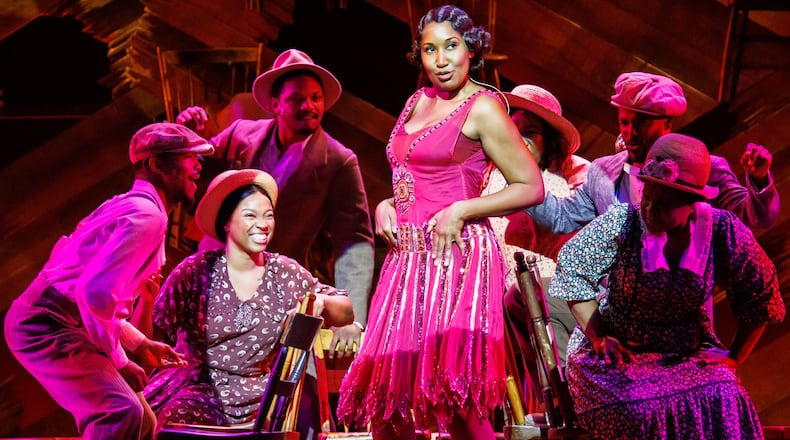Steven Spielberg drew appreciable criticism, at least in certain circles, for his 1985 screen version of Alice Walker’s 1982 novel “The Color Purple,” and not only because he was a white man directing a story by and about Black women. While there was no denying Spielberg’s cinematic skills, or that the film was artfully crafted, some people complained the movie was too glossy, essentially softening and sentimentalizing the depiction of a life experience that was anything but so many pretty pictures.
Walker’s original book, after all, told the sad Depression-era tale of Celie, an impoverished and put-upon Georgia woman — twice raped and impregnated by her stepfather, tragically separated from her children, cruelly torn from her loving sister, abused and oppressed by her husband. Still, I’ve never quite understood the difference, really, between the reaction to Spielberg’s arguably questionable interpretation of the material and the basic notion of a subsequent musical stage adaptation of it.
Our own Alliance Theatre premiered the singing-and-dancing rendition of “The Color Purple” in 2004, and it opened on Broadway the following year. Scripted by Marsha Norman (best-known, perhaps fittingly, for writing the suicidal domestic drama “‘night, Mother”), and featuring a score composed by Brenda Russell, Allee Willis and Stephen Bray, it has become an enduring, crowd-pleasing favorite. In addition to several national touring company productions (two of which visited the Fox Theatre here), there was also a 2015 Broadway revival. And Actor’s Express mounted it again locally in 2018.
But, as I’ve posited before in previous reviews of the show, is a feel-good musical filled with peppy and joyful songs any more authentic a representation of Celie’s generally dire and downtrodden situation than was the beautified, sanitized Hollywood take on it? Yes, the story culminates with heartfelt uplift, but everything somehow seems less meaningful given all the other upbeat flourishes along the way.
How bad can it be for these characters, when they’re prone to performing a lot of splashy and rousing tunes that tend to obscure the abject severity of the circumstances? The proverbial Greek chorus of the piece, a trio of gossiping busybodies, is a comic-relief cross between the sassy street urchins from “Little Shop of Horrors” and the dithering “pick-a-little, talk-a-little” ladies from “The Music Man.”
Between boisterous production numbers, highly personal plot developments feel almost prosaic and incidental: “Oh, by the way, Celie, I happened to find a letter from that long-lost sister you thought was dead.” It’s as though, at some point, the creative forces behind the musical made the assumption that everyone will have already read the book and/or seen the movie, and just decided to rely on the audience (and occasional snippets of lyrics) to fill in the numerous narrative blanks.
The lavish but lackluster staging of “The Color Purple” currently on display at City Springs Theatre is directed by Kamilah Long, with music direction by Lewis Webb, and Derrick Jackson conducting an eight-member orchestra. As performed by a large and talented ensemble of 21 singers and actors, the strong vocals primarily overpower the mainly sketchy characterizations.
Credit: Ben Rose/BenRosePhotography.com
Credit: Ben Rose/BenRosePhotography.com
Musical highlights belong to Felicia Boswell (as Celie) and Safiya Fredericks (as the sultry juke-joint singer Shug Avery): their respectively impassioned and intimate solos “I’m Here” and “Too Beautiful for Words”; and their touching duets “What About Love?” and the show’s title song.
Elsewhere, Gavin Gregory (as Mister, Celie’s villainous husband) belts out his solo emphatically, and Trevon Davis (as Harpo, his affable son) and Kayce Grogan-Wallace (as Sofia, Harpo’s opinionated wife) make the most of their fun, if needless, “Any Little Thing” routine. Among the disappointments: the big “African Homeland” number, which lacks the necessary atmospheric sweep and spectacle.
Although the drama supposedly spans a few decades, the negligible sense of time and place is often problematic to this particular rendering of events. Character transformations and epiphanies are, at best, too vague and sudden — Celie’s evolution into a liberated businesswoman, Mister’s late-breaking change of heart and mind, Sofia’s wrongful downfall and belated reawakening — and, ultimately, the emotional impact of the story pays a definite price for it.
THEATER REVIEW
“The Color Purple”
Through May 22. 8 p.m. Thursdays-Saturdays; 2 p.m. Sundays; 2 p.m. May 14 only. $48-$85. Byers Theatre (at the Sandy Springs Performing Arts Center), 1 Galambos Way, Sandy Springs. 404-477-4365, www.cityspringstheatre.com.
Bottom line: A well-sung musical, but not an especially well-told drama.
About the Author
Keep Reading
The Latest
Featured



